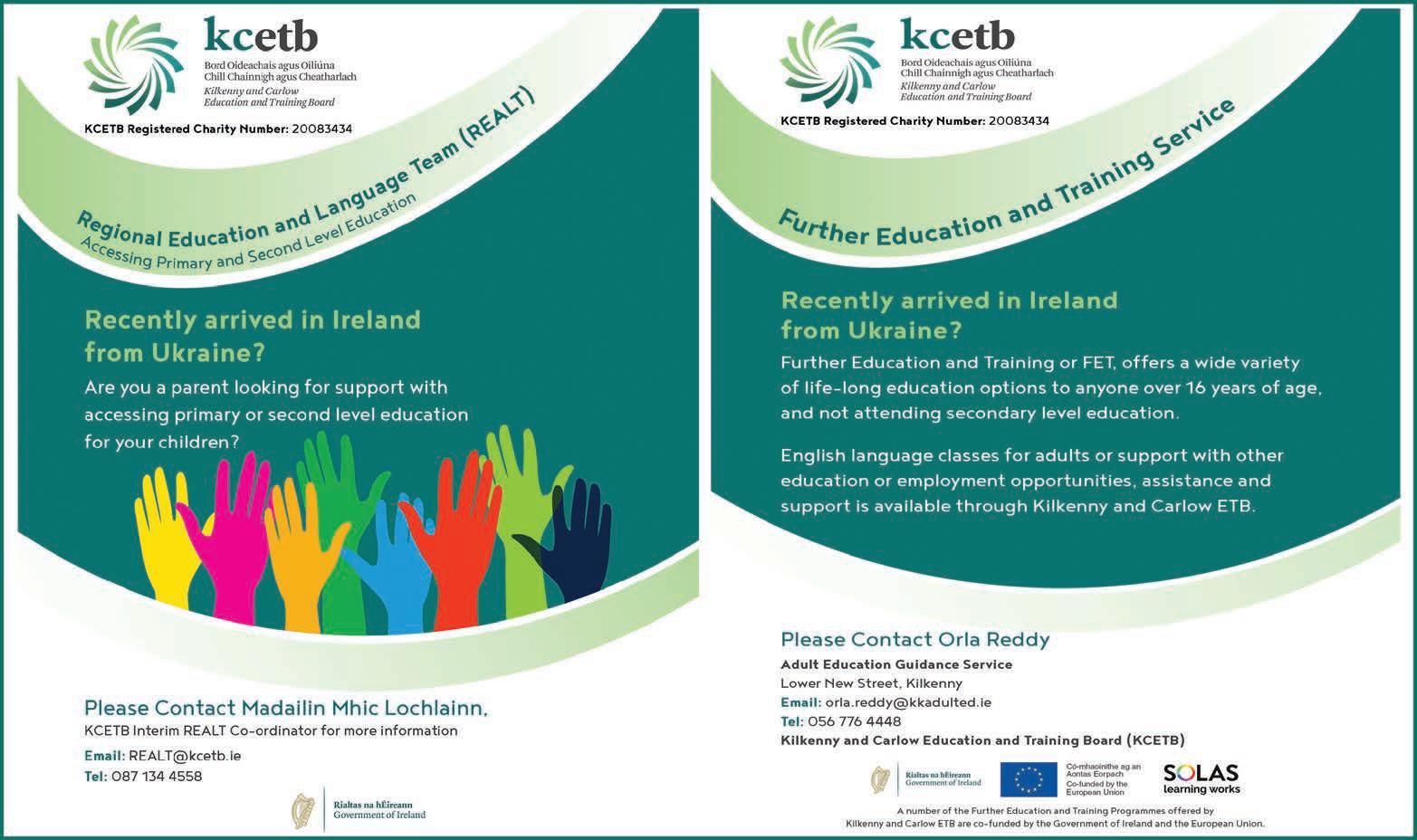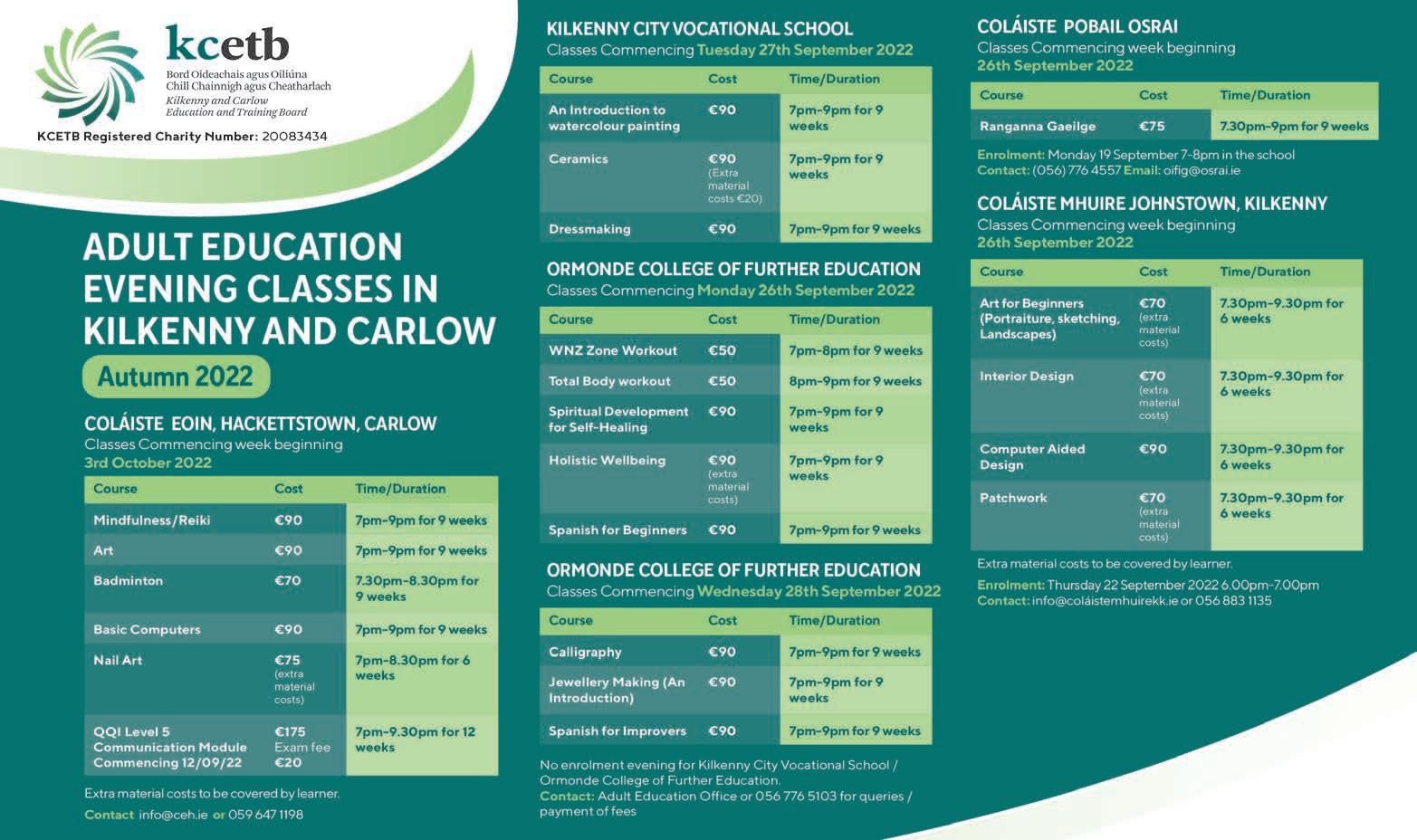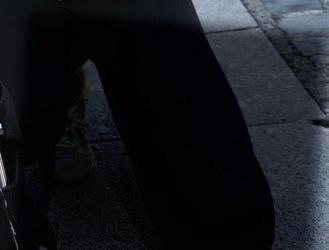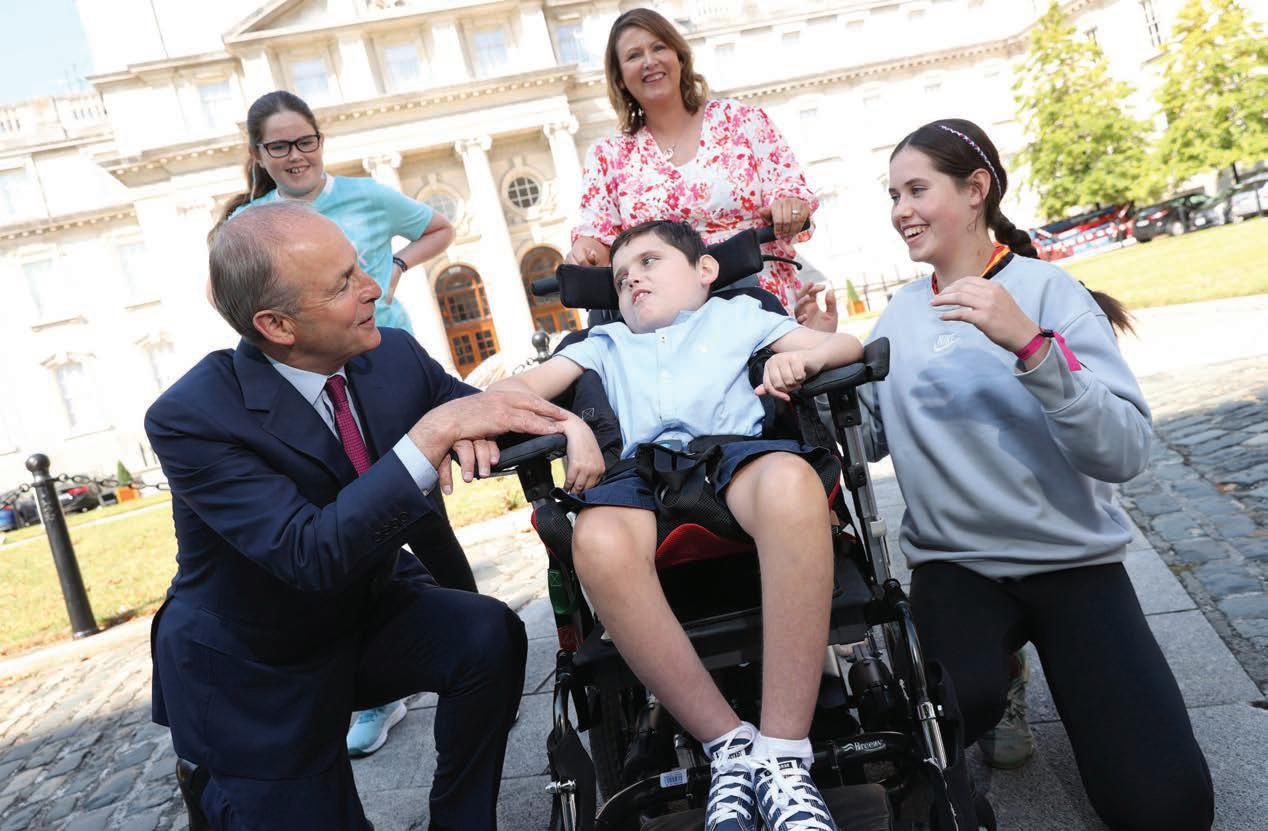
18 minute read
Marianne Heron
As I See It

Advertisement
Marianne Heron The trans debate: the trouble with pronouns

How can someone get suspended from their job just because of a four- letter word? No, it wasn’t one of those words but the apparently inoffensive third person plural pronoun ‘they’.
The matter didn’t end there but continued in a row which led to contempt of court proceedings and imprisonment for the individual involved. How can a single word cause such conflict?
For background rewind to 2006 when the Transgender Equality Network Ireland was founded and to 2015. That year Ireland became the fourth country in the world to allow people over 18 to change the designation of their gender on government documents through self-determination. So, he can become a she and vice a versa simply by self- identifying. This is where the word ‘they’ come in, a bit of a tautology maybe when a plural word is used for a singular person but come to think of it the late Queen of England sometimes uses the royal ‘we’.
Teacher: ”Can I ask them if they have done their assignment? Pupil: “No, we haven’t, our dog ate it.”
Maybe we do need a new pronoun and there are now 76 pronouns in use in different countries to apply in transgender situations. The French have rather chic ones : ve for hom ver for her and eirself so they don’t use the awkward ‘they’ .
There are nearly as many new gender descriptions as there are pronouns within the LGBTQ grouping starting with agender (someone who does not identify with any particular gender) and continuing to androgyne, and the alphabet to, aealgender, mirrorgender and omnigender, so plenty of choice there.
Gender is both what individuals feel themselves to be and a social construct whereas sex is genetically determined. The presence of the sex chromosomes is in the genetic code: two X chromosomes (XX) make a girl, whereas an XY make a boy. Only the female sex is capable of producing eggs and only the male sex produces sperm. The World Health Organisation (WHO) defines sex as “the different biological and physiological characteristics of males and females, such as reproductive organs, chromosomes, hormones, etc”.
This where different ideologies can come into conflict.
But back to the situation at the start of this column: where a teacher was jailed for contempt of court for disobeying an order not to attend the Westmeath secondary school where he taught. The situation escalated from Enoch Burke’s refusal on foot of an instruction to school staff to call a boy a girl and refer to the pupil as ‘they’. He was put on temporary administrative leave pending a disciplinary process but he continued to turn up at the school and a court order was then made against his attendance there.
At the court hearing Mr Burke said that what he was being asked to do was contrary to his conscience and his Christian beliefs. So here there is a conflict of two different belief systems, one claiming to reflect Christian views and the other reflecting trans ideology. In this particular situation the trans ideology appears to be prevailing. A pupil’s feelings need to be protected but what about respect for the teacher’s beliefs? I wonder how many schools there are now where teachers are required to use ’they ‘ for transgender pupils, a phenomenon which seems to be spreading rapidly.
Wilson’s Hospital School is not an isolated incident but one of a number of cases in other countries, where individuals who do not agree with trans ideology are accused of being transphobic and have lost their jobs. There have also been clashes over the right of trans women to compete in female sport and the right to have single sex spaces in women’s refuges, toilets and prisons.
Thankfully, the climate in Ireland has changed from one which was often homophobic to tolerance and inclusivity: the 2015 Referendum on same sex marriage was passed by a twothirds majority. I think it would be a shame if a new intolerance emerged and the prevailing ethos in education, employment and sport were to discriminate against those who believe that sex in men and women is genetically determined.
Transgender Equality Network Ireland (TENI) claim their vision is for “a world where all people, regardless of gender identity or expression, enjoy full acceptance, equality and human rights”. What happened at the Westmeath school seems at variance with this claim.
Surely, we should hope for acceptance of different points of view, something especially important to learn in our classrooms.

The white haired boy
Part 1
Old tales of the ‘Troubles’ were grist to the mill for Moriya Phelan, who lived up the road from my house in Baurscoobe, near Dunamaggin. {I never saw her name written down – but it was pronounced Morr-eyeagh.} When I was seven or eight, she was an old woman, would have been born in the early 1880s. Was the granny of the departed much-loved Kipper. One story she would often relate was - and is to this day – a puzzler. I only ever got the bones of it, so I’ll have to use poetic licence while I make a little literary smorgasbord. Just bits of the tale, dribs and drabs, were released to me.
Moriya didn’t dish this one out with her usual bare-faced truth-less gusto: she seemed a strangely outof-character and unusually reticent little old shawlie indeed, when she muttered away about ‘ e WhiteHaired Boy’. [ at title was given to any lad who was especially favoured by life, in those hard days.]
Her heart was never really in the telling of it. Yet, in the family tradition – she couldn’t resist acting the seanchaí – being the seanchaí. Unusual emotions I’d never seen before were there - it seemed ‘a bit too close to home.’ is reticence was odd in the extreme with Moriya, who would – if there was ever such a place as ‘Exaggeration City’ – be its elected, selected, and respected Pearly Queen!
Now, this much is fact; this I know. One of her sons – we’ll call him ‘Steve’ - had been {like myself much later on} a little wanderer of a child. Probably more resourceful than this writer. In his young days, there was a large military barracks in Callan, and the Black and Tans were always around the town, robbing and generally running amok, shooting the place up. As was their wont, their habit, their nature….
Steve, as was true of all labourer’s sons, was never even remotely ush with money – and decent food was a luxury. As a child, he would have been weaned from the breast onto ‘goody’ – which was a mixture of bread, sugar, and watered-down milk. Not much in the way of nourishment there. I know. I was among the many thousands who were reared on it. It was ‘danger time’ in a child’s life: get past the goody stage - and you had a 50/50 chance. { ere was even a little song the Mammy would sing to us wee slurping nippers: “Well I know what babby wants – it’s goody on a saucer!”}
But soon after weaning, we learned, like fox cubs, to forage and pilfer. With a di erence: around our area, we never robbed friends, or decent farmers. Oh, yes – there were a few of that sainted breed about – without them – it’s doubtful if this story would be written. And – contrary to the accepted stereotypes of the Protestants and Blueshirts {our “mortal enemies” according to Dev and his lackeys} those good people were among the very best. And still are. {Loughbrack C of I community: I owe you a thousand feeds! ank your Mams and Dads for me, in your prayers.}
Yes, Moriya’s Steve was a little tearaway. Also an opportunist, with his eye and brain ever alert for the next chance. Only lads such as he made any progress in life in those days – especially if born into poverty. A life of labour and lousy grub awaited most poor little chisellers.. Who would, if they were lucky – or unlucky enough - to eventually wed – generate more, endlessly more, generations of subservient priest-whipped slaves. e bog, the boat, or the box; those were the choices. Charity was absent then; mostly.
Even had the Rome-obsessed middle and upper classes the power to help the poor by simply clicking a switch to raise them out of poverty and degradation – they would not have done so. Never. Wouldn’t have bothered their arses. Why? Because of their prevailing dogma: never let poor people ‘get above themselves.’ at was the way. I suppose they needed to feel superior to someone …
So, young Steve pulled in wherever the rations were the soundest, using whatever quick wit and foresight was needed to advance his little cause.
As I said, the Black and Tans were raging through the countryside: still at it when he was ten or eleven. e Tans were genuine hard men from the trenches and battles of Mons and Picardy; where, according to the sweet old song, ‘roses were blooming.’ On the graves of young men, their former comrades, mostly. Popular legend has it that these men were all bad. But people say that about their local political opposites too.
Prominent amongst the Tan semimercenaries were a large amount of criminals; released on condition they’d go and kill the Irish. “Kill” is the word, readers: that’s what soldiers do; it’s their job. It’s the reason they are given great big guns with which to make holes in you. Even the chaplains {padres} have their part in the killing: blessing the guns. Yep – I’ve seen ‘em at it. Why else are they in the Army – with Commissioned O cer rank? No lower ranks for the reps of the Big JC: ‘Bless you, my child – here’s a tin of spam – clear o and kill some bollix’ …
Little Steve had a fair interest in the ‘Tans, mainly to do with what he could scrounge or loot from them, when they were back at the barracks. Like the wild apple and plum trees, the hazel and ‘bread nuts,’ the mushrooms in autumn, the sweet briar and the skeoch haw - they were a source to be tapped. No more, no less. What B&Ts got up to in their ‘spare time’ as Steve termed it – {their gun-waving terrorisingtime, that is} – bothered him not at all.
After a while they got used to the little blonde {only one in his family} tearaway hanging about, and would buy a few fresh {freshly robbed, that is!} eggs from him, or hazel nuts he picked in He ernan’s Rath – and squirreled away to sell later at fty to the penny. So, the time came when he was allowed to ride on their troopcarriers – the infamous Crossley Tenders. He soon became a sort of mascot. Of course, they asked him for information. And of course – he gave it to them! But, being a true son of Moriya – he was absolutely incapable of telling anyone anything except huge lies and ‘good ones’! Which the Tans took as gospel!
Cute enough, he often led them to the houses of informers and ‘Dacent Boys’ – where the Tans robbed to their hearts content. And so did Steve! He knew the locals didn’t give a shite what happened to those lousers! {Remember, reader – I’m relying on the old cuairdioch with Moriya for most of these details – I never met Steve.}
What the Tans weren’t quite aware of was that while he was amusing and helping them – he was passing along, every night, details of what went on, to a pal of the local IRA Intelligence chief! Who, of course, would have suggestions passed back to Steve as to the next day’s ‘operations’ – plus a few handy pennies! He was never asked to send the ‘Tans into an ambush – and would not have done so. He knew most of them were real bad characters – but they were kind to him in their own rough savage way. Which, in the hard world back then, went a long ways …
But, eventually, the Tans got a bit leery of him, and the lifts mostly stopped. Which didn’t worry Steve, as there was plenty opportunity for a bright boy to get on. But they still liked the chirpy little gorsoon, and he had the run of their tents or barracks. Which he found most pro table. But as the stu he lched was always HM’s – and not personal – they didn’t give a shite. He was even reputed to have snitched a Mills Bomb – {hand grenade} - for which he got ten bob from ‘ e Boys’ – a fortune in those days. en one day, as he was hanging around the Callan barracks, two Crossley Tenders came tearing down from the Mullinahone direction. ey roared into the yard……….
To Be Continued
Ned E.


Up to 43% of adults in the Republic of Ireland agree that, if they needed to receive palliative care, they would not have enough information to enable them to have conversations or make decisions about their care. e nding is from a new survey of the public’s perceptions of palliative care commissioned by All Ireland Institute of Hospice and Palliative Care (AIIHPC) to highlight Palliative Care Week which is just ending.. e theme for the ninth annual Palliative Care Week was ‘Palliative Care: Living as Well as Possible’ which was chosen following collaboration with AIIHPC’s members and the wider palliative care sector. It re ects what palliative care is and the positive impact that palliative care has on the lives of people with life-limiting illnesses and their families; allowing them to live their lives as fully as they can. e survey of 1,000 people in Ireland carried out in July 2022, also highlighted some of the perceptions that exist about palliative care: • 43% agree that if they had to have palliative care, they do not feel ready to have those conversations or make those decisions • 44% of people think of cancer when they hear the term palliative care • 75% of adults agree that when they hear the term palliative care, they think that it is about supporting the quality of life for those with life limiting conditions. • 29% of adults would be too scared to make decisions or have these conversations if they needed to receive palliative care. Speaking ahead of Palliative Care Week 2021, An Taoiseach Micheál Martin, said: “I am delighted to support the Palliative Care Week campaign. Palliative care greatly improves the experiences of those who are living with progressive or life-limiting illness, and as this year’s theme says, can help them to live as well as possible.
“It is important to emphasise that palliative care not only supports the person who is ill but it also supports family members, carers and those close to the person. is support is vital for the wellbeing of families during those challenging times. is Palliative Care Week, I want to acknowledge the work of all those who work in the palliative care sector, across the island of Ireland, in so many di erent roles, who constantly work to make better the lives of those in their care,” the Taoiseach said.
AIIHPC Director, Karen Charnley, said: “While we are encouraged to see that most people know that palliative care is about supporting someone with a life-limiting condition, we can see how important it is that during Palliative Care Week, we continue to share information about the bene ts of palliative care so that people become better informed about the supports that are available, so that they do feel comfortable to have conversations and make decisions about their care.”
Ms Charnley said the AIIHPC wanted to encourage people to talk to their GP or any health and social care professional about palliative care. *See thepalliativehub.com for more information and advice about palliative care.
Dr Feargal Twomey, Consultant in Palliative Medicine, Milford Care Centre & UL Hospitals Group and HSE Clinical Lead for Palliative Care said:
“Palliative care helps people to live as well and as fully as they can for as long as possible, despite their living with a serious life-limiting illness. Palliative care can improve quality of life and enable each person to carry on doing things that matter to them and spend important time with family. “Palliative care is for people of all ages, at all stages of illness, wherever they live, or if they are in hospital or in a hospice. Palliative care is not only for people living with cancer, but for people with motor neurone disease, dementia, advanced heart and lung disease and other progressive conditions too.”
John Wall, who is receiving palliative care for his cancer, has talked about the positive impact it has had on his quality of life:
“Quality of life ix=s the single most important component for me, to successful living with an advanced cancer diagnosis. I’m extremely fortunate that, as a direct result of Palliative Care like inte vention, mine is thankfully as good as it’s ever been. eir ability to successfully manage my pain has given me back a part of my life that I thought was lost forever,” he said.


SPECIAL REPORT
In good hands: An Taoiseach Micheál Martin and the Dunne family (Eoghan, Teresa, Keelin and Ciara) launching Palliative Care Week 2022. Eoghan Dunne avails of hospice and palliative care services from LauraLynn Children’s Hospice
Half of adults don’t know enough on palliative care
More than 75% think about death when they hear the term palliative, says survey

Visitthepalliativehub.com to nd out more. #pallcareweek.


Online help for students ... we’ll do the sums
Parents and guardians of Kilkenny rst and second-year secondary students have been o ered a free online learning support lesson which will help them assist their child with Maths. e Tuition Centre, one of the country’s leading online learning support providers for post-primary students, is running a support programme in Maths for parents and guardians of rst and second year students for one hour a week over nine-weeks from Monday, September 26.
To allow parents and guardians get a feel for the programme, the rst lesson, in algebra, is free of charge.
“It is an opportunity for parents and guardians to provide tangible support and get advice and direction from an experienced teacher on how they can help their child with Maths at post-primary level,” said Head of Maths at the Tuition Centre, Eoghan O’Leary. e Tuition Centre has pioneered online learning support for secondary school students. More than 1,000 Leaving Cert students availed of its online support in 2022. e nine-week package will also cover natural and rational numbers, sets, geometry, probability and statistics.
It will delivered by Maths teacher Aoife O’Mahony, who has over 15 years’ experience teaching higher level Junior and Leaving Certi cate Maths.
She has delivered Maths workshops to both rst-year and second-year parents for the last ve years, equipping her with the techniques required to help parents and guardians support and guide their children as they transition from primary to post-primary.
Since its inception in 2020, e Tuition Centre has emerged as a leader in the Irish education sector, thanks to its innovative, time saving and cost-e ective supplementary exam support for secondary school students. e Tuition Centre support classes are available both live, and as recordings, and provide access to supplementary exercises, study notes, etc. It stands alone in providing nationwide accessibility to high quality classes and resources at an affordable price.
Using highly regarded teaching professionals, e Tuition Centre has democratised the sector, allowing secondary school children access to learning support which would otherwise be unavailable due to time, geographical and cost constraints.
Students have access to recordings of classes right up to the June exams.
“ e transition from primary to post-primary education can be challenging for parents and guardians, as well as students,” said Mr O’Leary.
“Supplementary classes providing parent and student support are now an accepted part of the Irish secondary education narrative, complementing the work of schools.
“E ectively, using highly regarded teaching professionals, e Tuition Centre allows access to learning support which would otherwise be unavailable.
“ e pandemic has quickly advanced the concept of online learning. Many Leaving Certi cate students take a subject not taught to them in school, and often, online support is the logical choice,” he said. e Tuition Centre is partnered with Examcraft, which, for over 25 years, has provided mock examination papers to Irish schools, becoming the leading provider of mock examination papers in the country.
*Further information is available at thetuitioncentre.ie.









